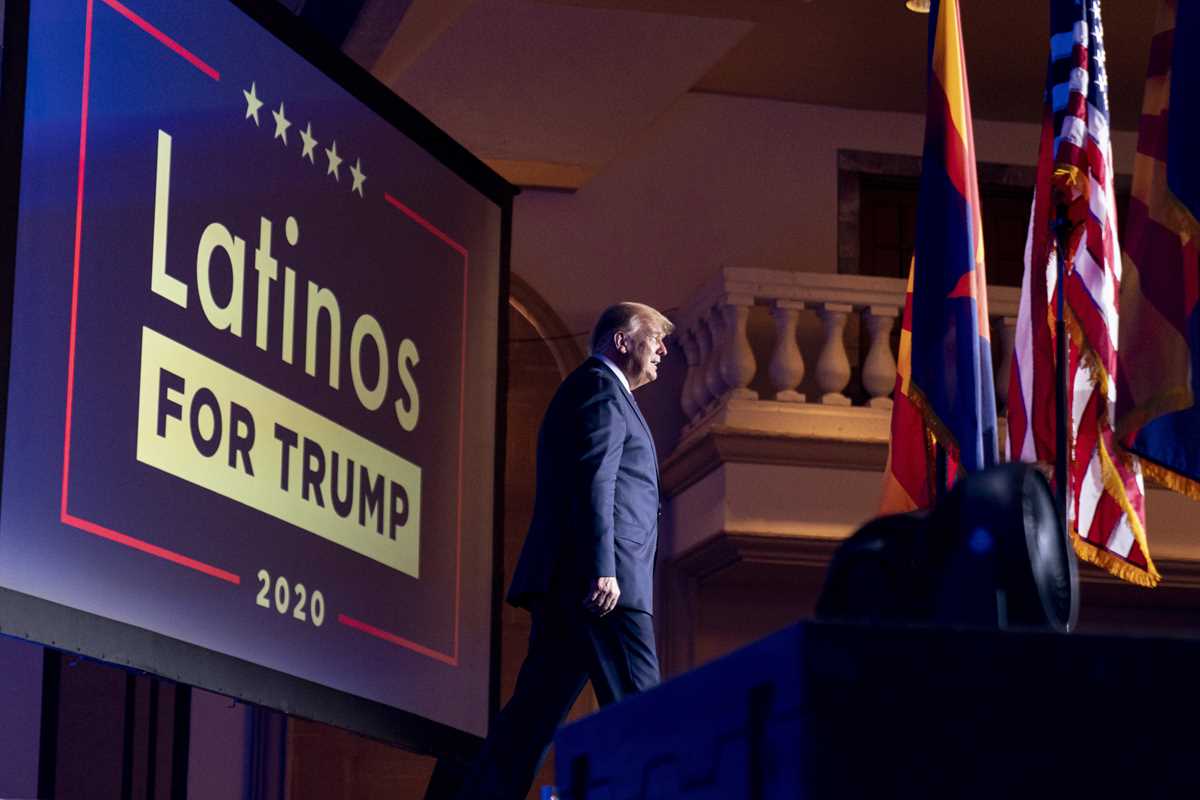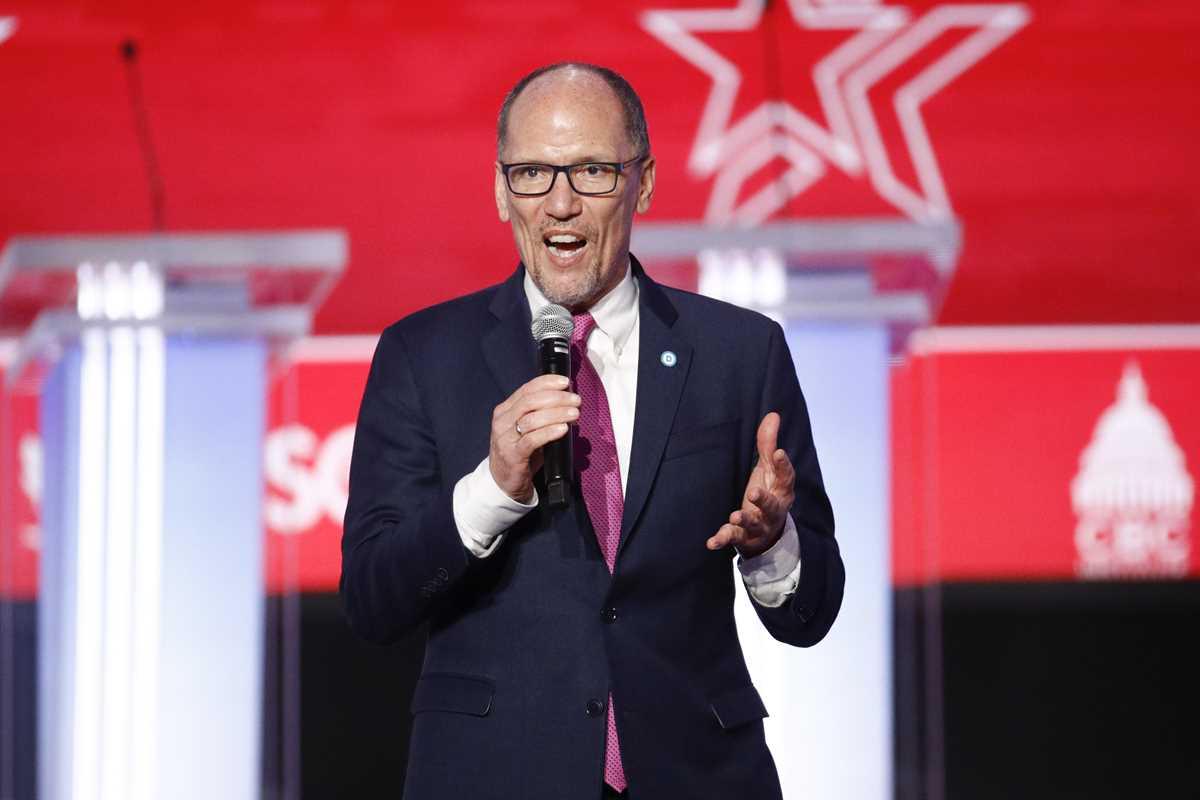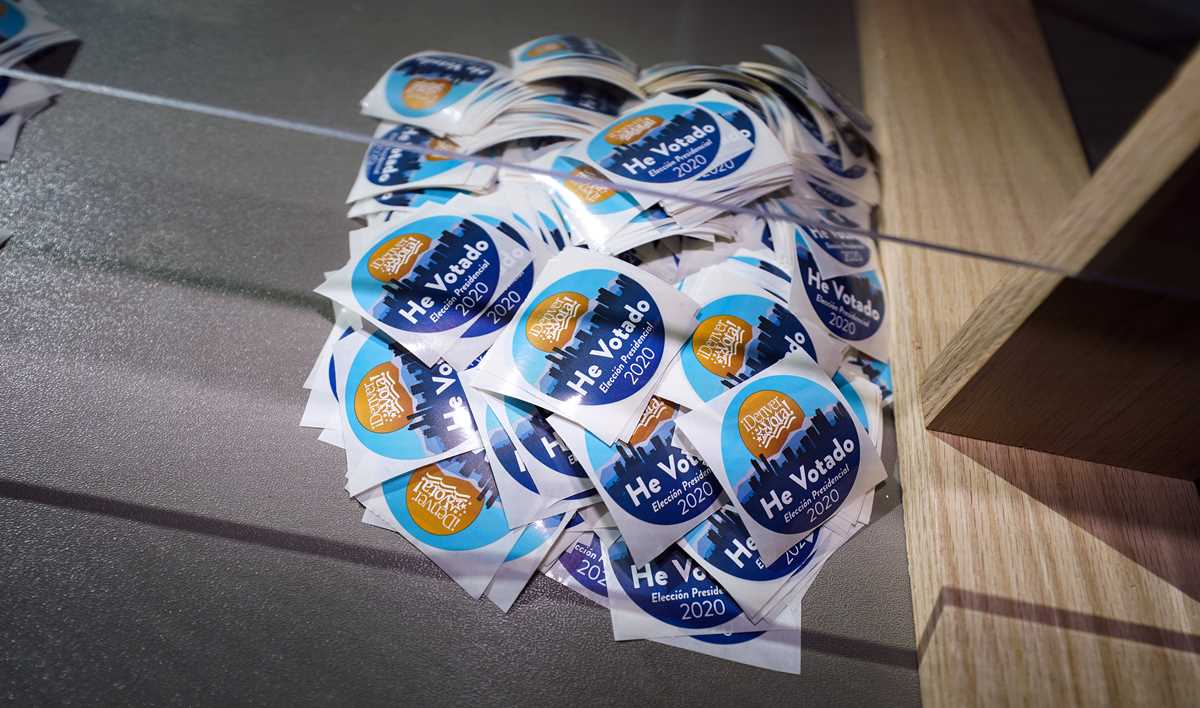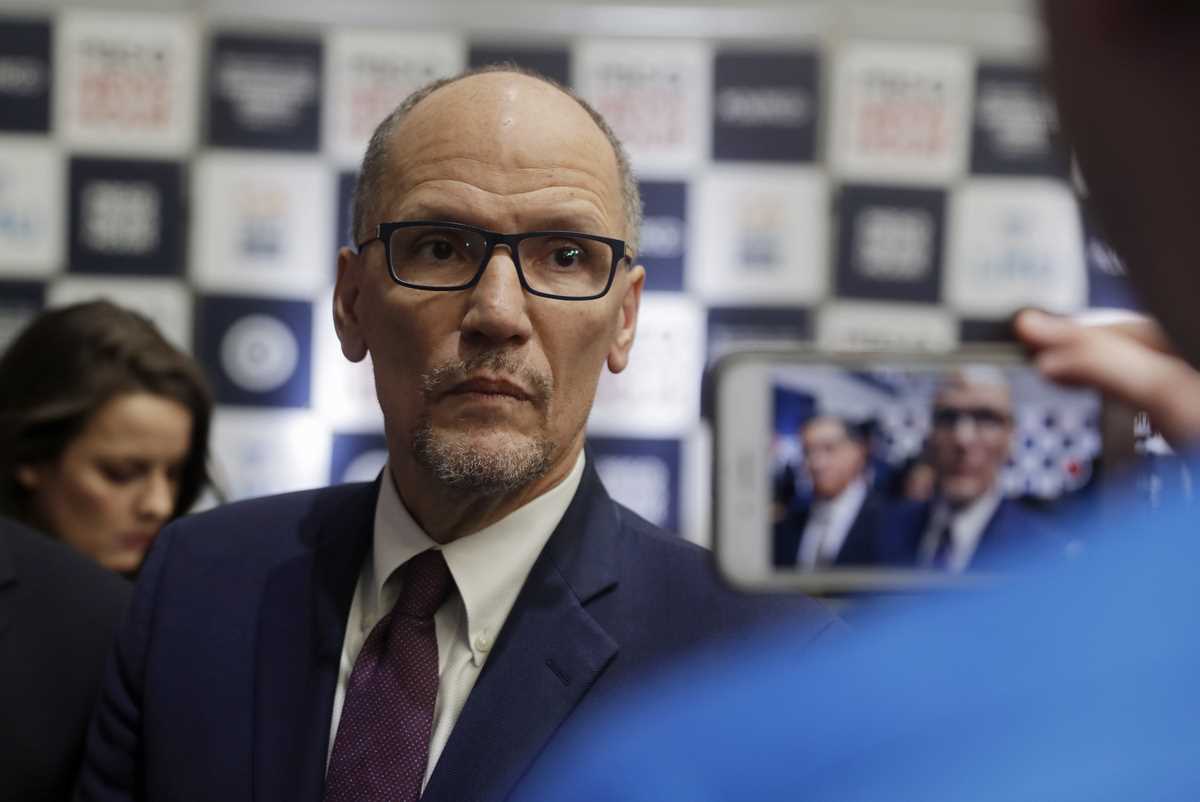 In this Sept. 14, 2020 file photo, President Donald Trump arrives for a Latinos for Trump Coalition roundtable at Arizona Grand Resort & Spa in Phoenix. (AP Photo/Andrew Harnik, File)
In this Sept. 14, 2020 file photo, President Donald Trump arrives for a Latinos for Trump Coalition roundtable at Arizona Grand Resort & Spa in Phoenix. (AP Photo/Andrew Harnik, File) In this Feb. 25, 2020, file photo Democratic National Committee chair Tom Perez speaks before the start of the Democratic presidential primary debate at the Gaillard Center in Charleston, S.C., co-hosted by CBS News and the Congressional Black Caucus Institute. (AP Photo/Patrick Semansky, File)
In this Feb. 25, 2020, file photo Democratic National Committee chair Tom Perez speaks before the start of the Democratic presidential primary debate at the Gaillard Center in Charleston, S.C., co-hosted by CBS News and the Congressional Black Caucus Institute. (AP Photo/Patrick Semansky, File) In this Oct. 30, 2020, file photo stickers printed in Spanish sit on the desk of an election judge to be distributed to voters after they cast their ballots in the atrium of Ball Arena, the home of the NBA's Denver Nuggets and the NHL's Colorado Avalanche in Denver. (AP Photo/David Zalubowski, File)
In this Oct. 30, 2020, file photo stickers printed in Spanish sit on the desk of an election judge to be distributed to voters after they cast their ballots in the atrium of Ball Arena, the home of the NBA's Denver Nuggets and the NHL's Colorado Avalanche in Denver. (AP Photo/David Zalubowski, File) In this Dec. 19, 2019, file photo Democratic National Committee chairman Tom Perez is recorded on a phone before a Democratic presidential primary debate in Los Angeles, Calif. (AP Photo/Chris Carlson, File)
In this Dec. 19, 2019, file photo Democratic National Committee chairman Tom Perez is recorded on a phone before a Democratic presidential primary debate in Los Angeles, Calif. (AP Photo/Chris Carlson, File)WASHINGTON (AP) — Tom Perez was a guest on a Spanish-language talk radio show in Las Vegas last year when a caller launched into baseless complaints about both parties, urging Latino listeners to not cast votes at all.
Perez, then chairman of the Democratic Party, recognized many of the claims as talking points for #WalkAway, a group promoted by a conservative activist, Brandon Straka, who was later arrested for participating in the deadly Jan. 6 insurrection at the U.S. Capitol.
In the run-up to the November election, that call was part of a broader movement to depress turnout and spread disinformation about Democrat Joe Biden among Latinos, It was promoted on social media and often fueled by automated accounts.
The effort showed how social media and other technology can be leveraged to spread misinformation so quickly that those trying to stop it cannot keep up. There were signs that it worked in the presidential race as Donald Trump swung large numbers of Latino votes in some areas that had been Democratic strongholds.
Videos and pictures were doctored. Quotes were taken out of context. Conspiracy theories were fanned, including that voting by mail was rigged, the Black Lives Matter movement had ties to witchcraft and Biden was beholden to a cabal of socialists.
That flow of misinformation has only intensified since Election Day, researchers and political analysts say, stoking Trump’s baseless claims that the election was stolen and false narratives around the mob that overran the Capitol.
More recently, it has morphed into efforts to undermine vaccination efforts against the coronavirus.
“The volume and sources of Spanish language information are exceedingly wide-ranging and that should scare everyone,” Perez said.
The funding and the organizational structure of this effort isn't clear, although the messages show a fealty to Trump and opposition to Democrats.
A report released this past week said most false narratives in the Spanish-language community “were translated from English and circulated via prominent platforms like Facebook, Twitter, and YouTube, as well as in closed group chat platforms like WhatsApp, efforts that often appeared coordinated across platforms.”
“The most prominent narratives and those shared were either closely aligned with or completely repurposed from right-wing media outlets,” said the report by researchers from Stanford University, the University of Washington, the social network analysis firm Graphika and Atlantic Council’s DFRLab, which studies disinformation online around the world.
Straka said via email that nothing from the #WalkAway Campaign "encourages people not to vote.” He declined further comment.
While much of the material is coming from domestic sources, it increasingly originating on online sites in Latin America.
Misinformation originally promoted in English is translated in places such as Colombia, Brazil, Mexico and Nicaragua, then reaches Hispanic voters in the U.S. via communications from their relatives in those countries. That is often shared via private WhatsApp and Facebook chats and text chains, and is usually small and targeted enough to be difficult to prevent.
“There’s this growing concern that this is very much part of the immigrant and first-generation information environment for a lot of Latinos in the United States,” said Dan Restrepo, former senior director for Western Hemisphere affairs at the National Security Council.
Those originating such campaigns in Latin America often cannot vote in the U.S., but can influence family in this country who do.
Kevin McAlister, a spokesman at Facebook, which owns WhatsApp, said that last month the company announced a policy removing accounts most responsible for spreading misinformation about the coronavirus vaccine and other vaccines, and has now taken down millions of pieces of content.
WhatsApp now limits users’ ability to send highly forwarded messages to more than one chat at a time. That has led to a 70% reduction in the number of such messages.
With the election behind them, the proponents of misinformation campaigns are now trying to spread chaos more broadly, notably by trying to create doubt about vaccines. Maria Teresa Kumar, president and CEO of Voto Latino, which works to promote Hispanic voting and political engagement nationwide, has personal experience.
Her mother runs an elderly care facility in Northern California and spent weeks planning to forgo getting vaccinated against COVID-19 because a friend at a gym had showed her a video circulating on social media. In it, a woman wearing a lab coat and claiming to be a pharmacist in El Salvador says in Spanish that such vaccines aren’t safe.
Another narrative shared from Latin America to the U.S. featured doctored video of the late, Nobel Prize-winning chemist Kary Mullis purportedly dismissing Dr. Anthony Fauci, the top U.S. infectious disease expert, as a “phony who knows nothing about virology.”
The vaccine disinformation may revert to more election related falsehoods as the 2022 midterm elections come more clearly into view.
Trump won about 35% support from Latino voters, according to VoteCast, an Associated Press survey of the national electorate. That helped him prevail in Florida, even while losing Arizona.
Kumar said that during the presidential race, misinformation in Spanish with Latin American roots would usually first hit Florida and “whatever sticks, spills over” and go to Texas, before reaching Arizona and New Mexico.
Now researchers will be watching to see if misinformation spreads between congressional districts. That could serve to ultimately discourage Latino turnout in the midterms.
Evelyn Pérez-Verdía a Florida Democratic strategist who has been monitoring disinformation groups in Spanish, said that since the election, those spreading it have been watching the Biden administration daily and building false narratives around current events.
Brazilian Americans, for instance, have gotten manipulated video from a Democratic presidential primary debate when Biden suggested he’d raise $20 billion to help Brazil battle Amazon deforestation that makes it sound like Biden was ready to send U.S. troops into that country.
Misinformation has continued at such a furious pace after the election that 20-plus Latino progressive groups drafted a January letter that urged Spanish-language radio stations and other outlets in Florida to crackdown on the practice.
Pérez-Verdía, one of the signees, said afterward that “it hasn’t dropped off. I consider now that it’s actually doubled down.”
Before you make your next trade, you'll want to hear this.
MarketBeat keeps track of Wall Street's top-rated and best performing research analysts and the stocks they recommend to their clients on a daily basis.
Our team has identified the five stocks that top analysts are quietly whispering to their clients to buy now before the broader market catches on... and none of the big name stocks were on the list.
They believe these five stocks are the five best companies for investors to buy now...
See The Five Stocks Here
Which stocks are major institutional investors including hedge funds and endowments buying in today's market? Click the link below and we'll send you MarketBeat's list of thirteen stocks that institutional investors are buying up as quickly as they can.
Get This Free Report